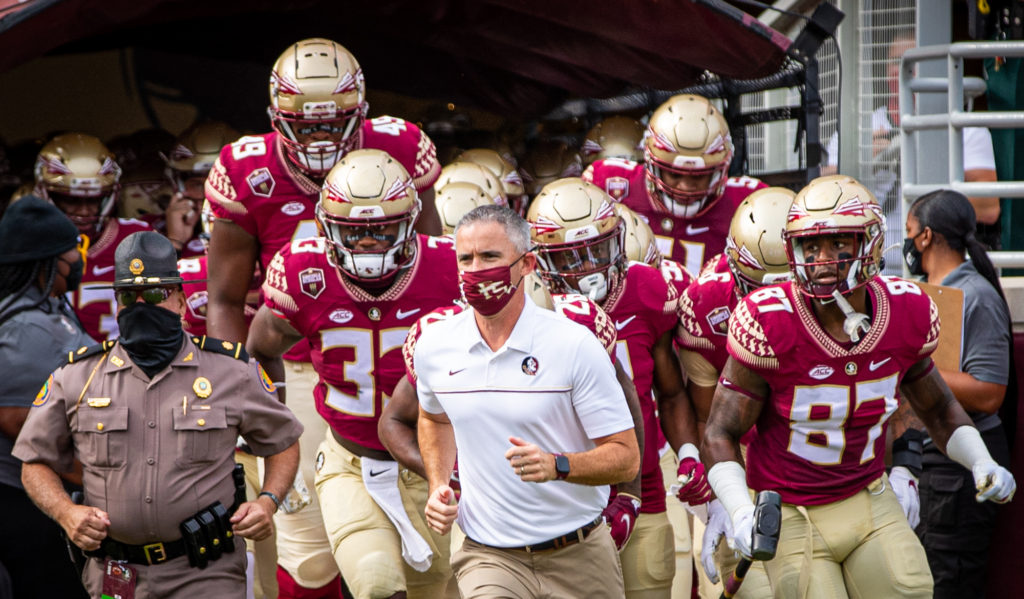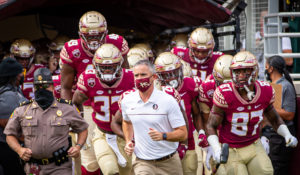
By Jonathan Carter
The 2020–21 NCAA football season is shaping up to be much different than seasons past,[1] and a recent rule change recommended by the NCAA Division I Football Oversight Committee (“Oversight Committee”) could result in coaches with losing records benefiting from the disarray.[2] Due to COVID-19, currently only 112 of the 130 total Football Bowl Subdivision (“FBS”) teams are playing to compete in forty-one scheduled bowl games.[3] To play in a bowl game, an FBS team usually must first satisfy the NCAA requirements governing bowl eligibility by becoming a “deserving team.”[4] Most importantly, the team must have “won a number of games against [FBS] opponents that is equal to or greater than the number of its overall losses.”[5] This rule mandates that an FBS team have a win-loss record equal to or greater than 50 percent before becoming eligible to play in a bowl game.[6]
With many schools’ football teams sitting this season out, it is likely impossible that enough FBS teams will satisfy this traditional bowl eligibility requirement.[7] Current NCAA rules provide exceptions in the event that there are not enough eligible teams to fill every bowl slot, but these exceptions are generally based on a team’s academic—rather than athletic—performance.[8] In response to the novel circumstances created by COVID-19, the Oversight Committee recently recommended the removal of normal bowl eligibility requirements for the 2020–21 bowl season.[9] This recommendation would eliminate the current win-loss record requirement, but must first be approved by the Division I Council, which is scheduled to meet on Oct. 13–14.[10]
Consequently, if approved, the rule change could have a direct impact on whether FBS coaches with losing records are entitled to receive additional compensation from their universities. In addition to a fixed salary, college coaching contracts frequently include bonus provisions that entitle a coach to additional compensation if certain on-field or off-field events occur.[11] While off-field performance bonuses are generally conditioned on the academic performance of the coach’s players, on-field performance bonuses are related to the team’s athletic accomplishments during the season.[12] The specific terms of coaches’ contracts vary, but a college coaching contract might condition the payment of on-field bonuses on: the team winning a specified number of games, the team playing in or winning a national championship, or the coach winning a national coach of the year award.[13]
Moreover, most FBS college coaching contracts contain an on-field bonus provision that entitles a coach to additional compensation if the team appears in a bowl game.[14] This reflects the university’s goal to incentivize the coach to win games and is consistent with the current trend of paying coaches significantly more for their services.[15] The economic justification for this trend is premised on the idea that teams who win games and play in bowl games gain national notoriety and generate more athletic revenue for the university.[16] As a result, universities and FBS coaches who entered into coaching contracts that include on-field bowl game bonus provisions did so under the assumption that the coach would at least have to satisfy the traditional NCAA bowl eligibility rules to receive that bonus.[17] The Oversight Committee’s new recommendation, however, would make this assumption false by allowing FBS teams with losing records to play in bowl games.[18] Ultimately, the recommendation’s effect will be determined by a football team’s win-loss record and the language of the bowl game bonus provision found in the coach’s contract.
To illustrate, Mike Norvell was hired to coach the Florida State Seminoles football team in December 2019.[19] Among other on-field performance bonuses contained in his agreement, Norvell is entitled to receive at least $100,000 if the Seminoles play in any bowl game while under Norvell’s direction as head coach, regardless of the team’s record or ranking.[20] The Seminoles currently have an overall win-loss record of 1–3[21] and have yet to face many talented ACC opponents listed on their schedule.[22] In a normal NCAA football season, if the Seminoles were to finish the regular season with a losing record they would almost certainly be ineligible to play in a bowl game.[23]
If the Oversight Committee’s recommendation is approved, the Seminoles could remain bowl eligible with a losing record and play in one of the forty-one scheduled bowl games.[24] This unprecedented outcome would entitle Norvell to receive an additional $100,000 on top of his approximately $4 million annual salary for what many would consider an unsuccessful season.[25] Interestingly, Norvell’s bonus provision is similar to that of many other major college football coaches including UCLA’s Chip Kelly,[26] Alabama’s Nick Saban,[27] and Texas A&M’s Jimbo Fisher,[28] in that their contracts entitle them to receive a bonus simply because they are the head coach of a team that appears in a bowl game.
Other coaching contracts, however, may avoid this result because of qualifying language in the bonus provision that requires the team to win a specified number of regular season games in addition to playing in a bowl game. For example, under the “bowl participation” bonus provision of the University of Oregon’s football coach, Mario Cristobal, his team “must have at least 7 regular season wins” for him to receive a $100,000 bonus for appearing in a bowl game.[29] Similarly, Clemson’s football coach, Dabo Sweeny, is only entitled to receive $50,000 for playing in a bowl game if his team also wins “eight or more regular season games.”[30] Thus, these universities have insulated themselves from the potential effect of the Oversight Committee’s recommendation by requiring their team to win a majority of their regular season games.
Historically, putting together a winning season was the first step an FBS coach was required to take before receiving any bonus for a team’s on-field performance. Among many other changes, COVID-19’s impact on college football has put this requirement into question. If the Oversight Committee’s recommendation is accepted by the Division I Council, FBS coaches with losing seasons could be entitled to receive bonuses from their universities for coaching in bowl games that they traditionally would not be eligible to play in.
[1] See Ivan Maisel & Adam Rittenberg, How College Football is Trying to Answer Its Biggest Return-To-Play Questions, ESPN (Jul. 1, 2020), https://www.espn.com/college-football/story/_/id/29387826/how-college-football-trying-answer-biggest-return-play-questions.
[2] See Greg Johnson, Waiving Bowl Qualification Requirements Recommended, NCAA (Sept. 24, 2020, 6:56 PM), http://www.ncaa.org/about/resources/media-center/news/waiving-bowl-qualification-requirements-recommended.
[3] David Scott, Every College Football Team is Likely Bowl Eligible in 2020. Here’s Why, What to Know, The Charlotte Observer (Sept. 22, 2020, 3:10 PM), https://www.charlotteobserver.com/sports/article245890615.html.
[4] See Nat’l Collegiate Athletic Ass’n, 2020–21 NCAA Division I Manual § 18.7.2 (2020), http://www.ncaapublications.com/productdownloads/D121.pdf [hereinafter NCAA Manual].
[5] Id.
[6] Id.
[7] David Cobb, NCAA Committee Recommends Waiving Bowl Eligibility Requirements for 2020 College Football Season, CBS Sports (Sept. 24, 2020, 8:27 PM), https://www.cbssports.com/college-football/news/ncaa-committee-recommends-waiving-bowl-eligibility-requirements-for-2020-college-football-season/.
[8] Id.; NCAA Manual, supra note 4, § 18.7.2.1.3.
[9] Johnson, supra note 2; see also NCAA Manual, supra note 4, § 18.7.2.3 (“The Division I Football Oversight Committee . . . shall have the authority to waive all postseason bowl game requirements based on objective evidence that demonstrates circumstances that warrant the waiver. . . .”).
[10] Johnson, supra note 2.
[11] Martin J. Greenberg, College Coaching Contracts Revisited, 12 Marq. Sports L. Rev. 127, 179–83 (2001); Randall S. Thomas & Lawrence Van Horn, College Football Coaches’ Pay and Contracts: Are They Overpaid and Unduly Privileged, 91 Ind. L.J. 189, 219–22 (2016).
[12] See Greenberg, supra note 11, at 179–83; Randall & Van Horn, supra note 11, at 219–22.
[13] See Randall & Van Horn, supra note 11, at 219–20; see also, e.g., Amended Coaching Contract #1 Between Mario Cristobal, Coach, and Univ. of Ore. (June 3, 2019) [hereinafter Cristobal Contract], https://2michy3wy0l30d34041dt1et-wpengine.netdna-ssl.com/football/wp-content/uploads/sites/3/2018/08/Cristobal-Mario-2017-24-amendment-1.pdf; Coaching Contract Between Dan Mullen, Coach, and Univ. of Fla. 17–18 (Nov. 26, 2017), https://2michy3wy0l30d34041dt1et-wpengine.netdna-ssl.com/football/wp-content/uploads/sites/3/2019/07/Dan-Mullen-Florida.pdf; Restated Coaching Contract Between Tom Herman, Coach, and Univ. of Tex. at Austin 8–9 (May 19, 2016), https://2michy3wy0l30d34041dt1et-wpengine.netdna-ssl.com/football/wp-content/uploads/sites/3/2015/10/Thomas-J.-Herman-Restated-1-0-Culture-LLC-17-36122-Restated-Head-Football-Coach-Employment-Agreement.pdf.
[14] See coaching contracts cited supra note 13; see also Greenberg, supra note 11.
[15] See Richard T. Karcher, The Coaching Carousel in Big-Time Intercollegiate Athletics: Economic Implications and Legal Considerations, 20 Fordham Intell. Prop. Media & Ent. L.J. 1, 27–33 (2009).
[16] Id.
[17] See, e.g.,Randall & Van Horn, supra note 11, at 198–99.
[18] Johnson, supra note 2.
[19] Teresa M. Walker, Florida State Makes Memphis’ Mike Norvell New Head Coach, Associated Press (Dec. 8, 2019), https://apnews.com/article/38ac32d5b32b4dc3aa929e6a6b55a743.
[20] Coaching Contract Between Mike Norvell, Coach, and Fla. State Univ. 7–8 (Dec. 7, 2019) [hereinafter Norvell Contract], https://2michy3wy0l30d34041dt1et-wpengine.netdna-ssl.com/football/wp-content/uploads/sites/3/2018/08/Norvell-Contract-12-11-19.pdf.
[21] Anthony Anderson, Williams, Crawford Lead No. 5 Notre Dame Past Florida State, Associated Press (Oct. 11, 2020), https://apnews.com/article/college-football-jordan-travis-kyren-williams-shaun-crawford-football-cdb11adf56ddb2ca56af9780ca4de865.
[22] Florida State Seminoles Schedule 2020, ESPN, https://www.espn.com/college-football/team/schedule/_/id/52 (last visited Oct. 13, 2020).
[23] See, e.g.,Tim Linafelt, Clock Strikes 12 On Streaks, Noles’ Football Season, Fla. State Seminoles (Nov. 24, 2018), https://seminoles.com/clock-strikes-12-on-streaks-seminoles-season/.
[24] Johnson, supra note 2.
[25] Norvell Contract, supra note 20, at 3–4, 7–8.
[26] Coaching Contract Between Chip Kelly, Coach, and Univ. of Cal. L.A. 5 (Nov. 25, 2017), https://2michy3wy0l30d34041dt1et-wpengine.netdna-ssl.com/football/wp-content/uploads/sites/3/2018/08/Chip-Kelly-UCLA.pdf (providing at least $40,000 bonus for coaching in any bowl game).
[27] Second Amended and Restated Contract Between Nick Saban, Coach, and Univ. of Ala. 9 (Sep. 4, 2018), https://2michy3wy0l30d34041dt1et-wpengine.netdna-ssl.com/football/wp-content/uploads/sites/3/2018/08/Nick-Saban-Alabama.pdf (providing at least $65,000 bonus for coaching in any bowl game).
[28] Coaching Contact Between Jimbo Fisher, Coach, and Tex. A&M Univ. 5–6 (Aug. 17, 2018), https://2michy3wy0l30d34041dt1et-wpengine.netdna-ssl.com/football/wp-content/uploads/sites/3/2015/10/Jimbo-Fisher-Texas-AM.pdf (providing at least $100,000 bonus for coaching in any bowl game).
[29] Cristobal Contract, supra note 13.
[30] Amended and Restated Coaching Contract Between Dabo Sweeny, Coach, and Clemson Univ. (Nov. 18, 2019) 7–8, https://2michy3wy0l30d34041dt1et-wpengine.netdna-ssl.com/football/wp-content/uploads/sites/3/2018/08/7127_SwinneyDabo_2019-1-1_CONTRACT.pdf.











